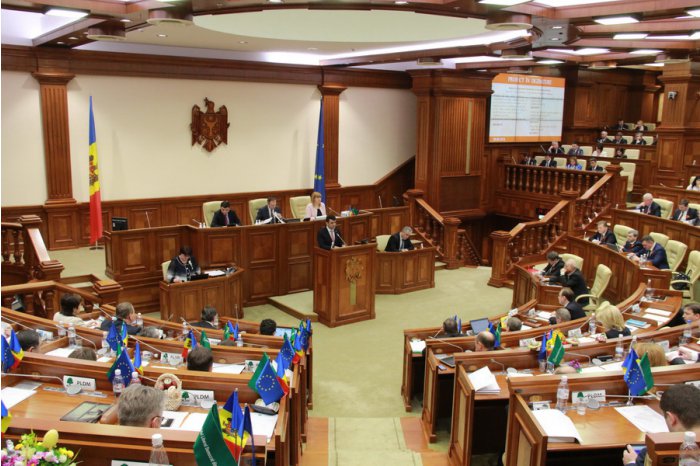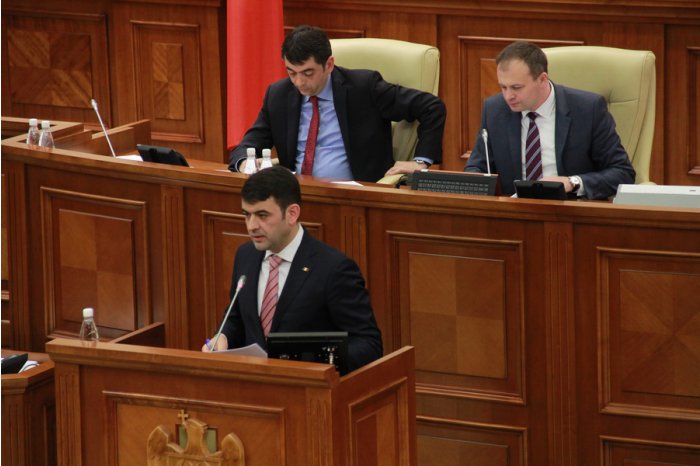Speech of Moldovan PM on government taking responsibility in parliament
16:21 | 09.04.2015 Category: Official
Dear Parliament Speaker,
Dear MPs,
Distinguished audience,
I came today before you, in order to present the draft laws on which the government took the responsibility on 8 April.
It is about: the budgetary and fiscal policy; Law on state budget for 2015; Law on the state social insurances budget and Law on mandatory medical assistance insurance fund for 2015.
The country is facing a very difficult economic situation. The negative economic phenomena of the end of 2014 will be inevitably felt in 2015 too. Among them, I will highlight: blocking of exports in some categories of products to Russia; serious economic situation in the region, which diminished trade exchanges with important partners of Moldova; significant depreciation of more currencies from the region, which affected the amount of remittances sent by our fellow countrymen, especially by those who work in Russia; difficult situation emerged in the banking system; significant depreciation of the leu’s exchange rate against the main reference currencies; strong inflation pressure felt in more areas of the economy; very high interest rates, which makes very difficult or impossible crediting of enterprises.
Thus, the expectations and forecasts for 2015 are significantly less optimistic than we wished. According to the forecast of the Economics Ministry, which stayed at the basis of this set of laws, the Gross Domestic Product will drop (at comparable prices) by 1 per cent against 2014. The average annual inflation will be of 6.4%, and the average annual exchange rate of the Moldovan leu will be of 19.3 lei against the dollar. A 10-per cent decrease of exports and 15-per cent of imports is also expected.
Since the government’s swearing in office, the main priority for us continues to be improving the economic situation. Now, we must take firm decisions in order to stabilise the situation. Thus, there is a need to approve and implement a set of complex measures, which will ensure the use of all available mechanisms in order to overcome the crisis. For this, it is necessary that the state’s institutions be fully functional.
We consider that, on the first position of the list of measures, which are to be undertaken, is the approval of budgets and budgetary and fiscal policy for 2015.
The main arguments are:
- Budgets stipulate a string of investments and expenditures, some of which will have as effect the boosting of economy, improving of conditions for subsequent sustainable development and creation of new jobs.
- Tax legislation directly affects the activity of economic agents. We are already late by several months against the normal steps for carrying out this process.
- Some aspects of talks with development partners are conditioned by the the budget's approval. The state’s commitments as to implementation of more reforms is also dragged by the fact that, due to lack of a functional budget, the state’s institutions cannot initiate procurement to this end. This will jeopardise the foreign financing.
- Now, the budgets' needed amount of expenses is temporarily financed at the level of 2014. Yet, the temporary budget does not cover the assumed salary increases and social aid for citizens benefiting from pensions under 1,500 lei for the entire year, and increase in pensions starting from 1 April. Also, the macroeconomic situation and dynamic of payments to the budget are entirely different against 2014. On this ground, each day of delay in approving the respective set of drafts enhances the risk of failure to meet the planned budgetary parameters.
For these reasons, we decided to opt for the government to assume responsibility - a solution that ensures an approval of this package of laws in a short period. I would like to underline that this decision is not intended to undermine the parliament’s authority or duties. All we want is not to risk the dragging of this process and we hope that the parliament will actively involve in subsequent rectifications.
The budgetary and fiscal policy includes a string of measures, among which I would like to highlight: increase of personal income exempted from taxation from 9,516 lei to 10128 lei; expanding of VAT reimbursement for investments into production areas; possibility to voluntarily register as VAT payer; diminishing excise quota for crude oil, according to the provisions of European directives; excluding taxation of incomes on state securities; partly deduction on fiscal purposes of expenses met by employers for optional medical insurance premiums.
The 2015 state budget law provides for an austere budget, due to the previously described economic situation. Revenues amounting to 30.3 billion lei are planned to be collected (increasing by 9.5 per cent against 2014). The financial support provided by foreign development partners is scheduled to stand at 2.7 billion lei, of which 0.9 billion lei will be directed to support the budget and the another 1.8 billion lei to implement projects jointly with development partners.
For 2015, the expenditures of the state budget are estimated at 34.3 billion lei, with an increase of 0.5 billion lei or 16.9 per cent compared to expenses made in 2014.
The capital expenditures are estimated at 8.3 billion lei or 24.2 per cent of the total amount of expenses. In 2015, capital investments will be directed to agriculture, transport and road management, complex for fuel and energy, communal management and the one for maintenance of the housing fund.
The deficit of the national public budget in 2015 will be of 4.5 billion lei or 3.8 per cent of GDP. The state budget’s deficit will be of 3.98 billion lei or 3.4 per cent of GDP.
The budget of state social insurances stipulates incomes of 13.48 billion lei, increasing by 12 per cent against 2014. In the structure of incomes to the state social insurance budget, own incomes represent 67.4 per cent and transfers from the state budget – 32.6 per cent. Total expenses of this budget for 2015 are set in amount of 13.57 billion lei, increasing by 11.6 per cent against 2014.
The 7.95-per cent indexation of social insurances has been included in the social insurances budget, in line with the forecast inflation and estimated increase in salaries. As much as 8.8 billion lei will be used to pay social insurances pensions and 1.3 billion lei – to pay allowances.
The revenues of the mandatory health insurances funds will stand at 5.1 billion lei and the expenses will amount to 5.2 billion lei. The deficit of the mandatory health insurances funds will be 100 million lei. The revenues will be made of the insurance premiums paid by employers and employees, 4.5 per cent each, in total amount of 2.7 billion lei, and transfers from the state budget worth 2.2 billion lei. We envisaged inclusion of new medical services, extending the list of compensated medicines, as well as the increase of the rate of their compensation.
Dear MPs,
Distinguished audience,
Assuming responsibility for this set of laws is a pressing need for the country and the citizens of Moldova. Taking into consideration the above-mentioned facts, I express confidence that you understand the importance and necessity of this decision.
Thank you for attention and I wish you happy holidays!
(Editor A. Raileanu)


